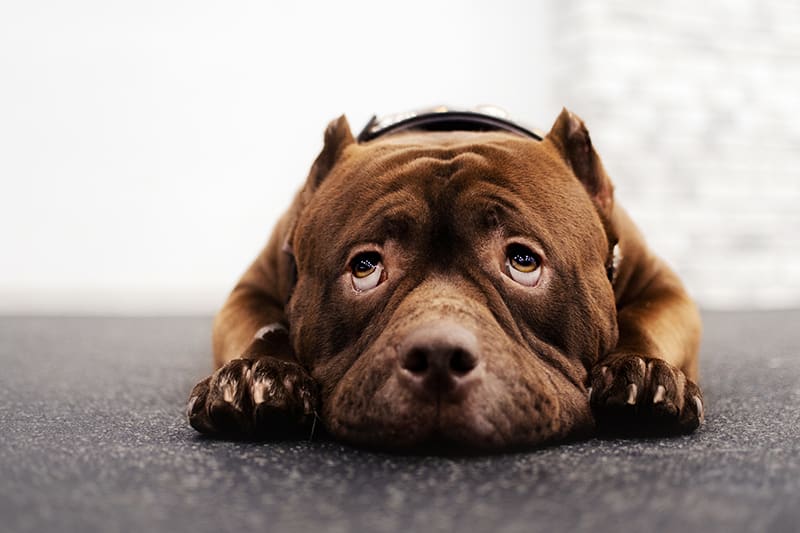Dog Depression & Anxiety
Do your dog's nerves seem to be on edge? Or perhaps is your canine companion exhibiting behaviors that lead you to believe they are depressed or anxious for some reason.
If your pup is showing three or more of the following signs, a trip to your vet could help to pinpoint whether your pup's symptoms are caused by depression, anxiety, or something else:
Common Signs of Dog Depression
If you find yourself wondering "is my dog is depressed", watch for these tell-tale signs:
- Disinterest in playing with people or toys
- "Sad" expression
- Lack of energy
- Avoiding you or hiding
- Growling, howling or aggression
- Sleeping too much
- Decreased appetite
- Not sleeping
Common Signs of Dog Anxiety
If you're concerned that your pup may be suffering from anxiety, these symptoms are the ones to look for:
- Destructive chewing or destroying furniture
- Obsessive paw licking
- Spontaneous bowel movement or urination
- Panting for no reason
- Pacing aimlessly
- Whimpering, trembling, or whining
Causes of Depression & Anxiety in Dogs
Dogs thrive on routine, which means that any major life changes or distressing events can have a huge impact on their emotional state.
While obviously emotional events such as their owner’s death or prolonged absence can bring on symptoms of anxiety or depression in dogs, other less extreme events such as a move to a new home, injury or illness, change in routine, or even a new pet or person in the home could be the cause of your pup's case of the blues.
Ways to Help Your Dog to Feel Better
If your dog is showing signs of anxiety or depression here are some tips that may help your pooch feel better.
See Your Vet
Some symptoms linked to depression and anxiety can actually have physical causes that need urgent veterinary attention. The first thing you should do if your dog doesn't seem happy is to schedule a visit with your vet.
Although dogs will often recover from depression with just a little extra love and attention from their pet parent, your veterinarian can provide medications such as antidepressants or anti-anxiety aids to help calm their nerves if things don’t show signs of improvement.
Keep your Pooch on a Regular Schedule
Anxious or depressed dogs benefit from predictable routines and environments, closely monitored social interaction, and lots of physical activity. Try to feed your pup and provide walks and exercise at the same time every day, even on weekends. Your pooch will know what to expect each day and begin to look forward to their walks and mealtimes.
Keep Your Dog Occupied
Bored pets often get into mischief, and become anxious or depressed. Make sure your pooch gets plenty of exercise before you leave the house for the day, and supply your pup with enough toys to keep them busy and help curb dog anxiety. Look for toys that are interactive or can be stuffed with treats to keep your dog's body and mind active while you're out of the house.
Social Time
It's important to recognize that dogs are social creatures and love to be around people and other animals. If your dog seems lonely and sad try taking your pooch to the dog park, group classes or doggie daycare for additional social interaction. You may even want to consider getting a companion animal for your dog.
Show Lots of Love & Patience
Dogs need lots of love and patience to feel safe and contented - even more so if they are feeling depressed or anxious. By giving your pup a little extra time and attention you may be able to alleviate these issues.
Note: The advice provided in this post is intended for informational purposes and does not constitute medical advice regarding pets. For an accurate diagnosis of your pet's condition, please make an appointment with your vet.
Are you concerned that your dog may be anxious or depressed? Contact us today to book an appointment with one of our South Charlotte vets for your canine companion.

Looking for a vet in Charlotte?
We're always accepting new patients, so contact our veterinary hospital today to book your pet's first appointment.
Related Articles View All
Ultrasounds for Pets
Today, we share information on why ultrasound is a valuable tool when diagnosing conditions in dogs and cats, what these images can tell your vet, and how to prepare for your dog or cat's ultrasound appointment.
Why does my pet need urinalysis?
What can urinalysis results tell a veterinarian about a pet's health? Why might your veterinarian recommend urinalysis for your furry friend? Read on to find the answers to these questions and more about urinalysis for dogs and cats.
How long can I leave my dog home alone?
Sooner or later, all dogs need to stay home alone. But how long can you leave a dog alone safely? How can you make time alone easier for your pup? Read on for tips and advice on leaving your dog home alone.
How to Tell if Your Dog has Hookworm
Think you've spotted hookworms in your dog's poop? In today's post, you will learn what hookworms are, how they can be treated, and what you can do to prevent your dog from contracting this parasite in the future.
